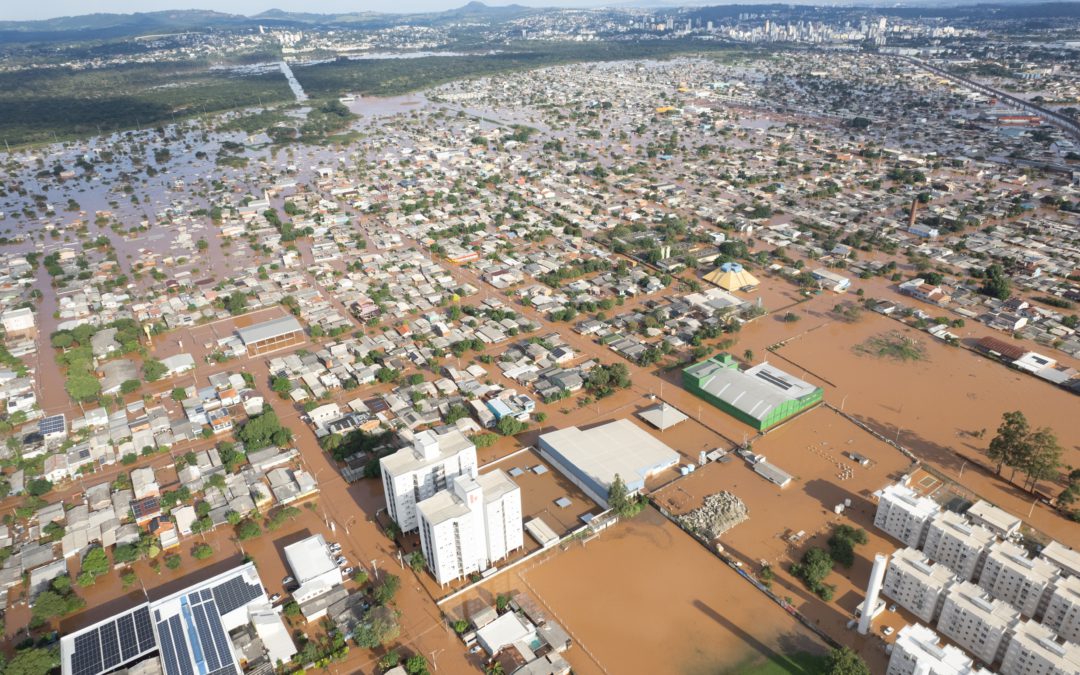When we talk about the climate crisis, it’s not just about the temperatures rising. We’re talking about a series of fast and unprecedented changes in the Earth’s climate patterns, including not only rising temperatures, but also more frequent and extreme weather events like storms, heatwaves, floods and droughts.
What most people fail to realize is that this series of events are not just hypothetical anymore. As proof, 2023 was the hottest year on record, and reports of natural disasters around the world are only increasing.
To name just one of the most recent tragedies, Brazil’s undergoing one of the worst floods in their history. Since April, there are areas experiencing more than 12 inches of rainfall in less than a week. One of Brazil’s state’s capital, Porto Alegre, reported more than two months of rain in just three days. Airports and bus stations are closed, cutting off the cities and leaving its inhabitants without food, water or gas.
This is just one example of how we are living through the climate crisis created over many years. It’s also important to remember this crisis affects everyone, not just tropical countries like Brazil. According to a report made by the University of Oxford, most of the countries facing the greatest relative increase in temperature are in Northern Europe. Dr. Radhika Khosla, co-author of the report, stated that by 2050, the energy demand for cooling will be equal to all the electricity generated in 2016 by the US, EU and Japan combined.
How veganism can help
When it comes to veganism, a lot of people argue that a plant-based diet ensures no animals are harmed to put food on your plate. However, in this blog post, we will explore how veganism can help the Earth’s environment, specifically if veganism can help solve this climate crisis.
First of all, at the heart of the climate crisis is the increase in greenhouse gas emissions that trap heat in the Earth’s atmosphere, which leads to rising temperatures. As a consequence, weather patterns suffer changes that lead to extreme weather events.
The production of food is responsible for one third of greenhouse gas emissions. Livestock farming, particularly cattle, produces substantial amounts of methane, a potent greenhouse gas, as they digest food. Animal agriculture also requires a substantial amount of land, which leads to deforestation and, in turn, releases the carbon dioxide, another greenhouse gas, stored in trees.
Beyond feed conversion inefficiencies, livestock farming also significantly drains energy resources. The energy needed to cultivate, harvest, and transport feed crops, along with the energy required to maintain livestock facilities, far surpasses the energy contained in the animal products themselves. In contrast, plant-based foods typically need much less energy for production and transportation. This inefficient energy usage in livestock farming contributes substantially to greenhouse gas emissions, exacerbating environmental impacts.
By abstaining from animal products, vegans and vegetarians play a crucial role in reducing the demand for livestock farming. That means less greenhouse gas emissions, less resources used and less energy wasted. A study conducted by Yale University, which analyzed data from over 38,000 farms, found that plant-based diets produce 75% less heat-trapping gas and require substantially less land compared to diets that include at least 100 grams of meat daily. These findings highlight the profound impact that dietary choices can have on environmental sustainability.
There’s also a parallel between environmental and personal health when it comes to these diets. In a study led by researchers at Harvard, healthier plant-based dietary patterns were associated with a bigger environmental health for requiring fewer cropland and fertilizer than foods like refined grains and sugar-sweetened beverages.
Is veganism the way to the future?
Now, for our question: is going vegan the way to solve climate crisis? First, it’s important to understand that climate change can also be aggravated by overconsumption and dependency on fossil fuels. However, by reducing the need for livestock farming, vegans and vegetarians are making a lasting impact. They may not be able to solve this issue alone, but they can definitely help. In the words of Dr. Scarborough, researcher at Oxford, “Small changes from being a high meat eater to a low meat eater can make a huge difference in environmental impact”.
Want to know more?
If you want to know even more about the climate crisis and it’s relation to a plant-based diet, here are the links to the studies mentioned above:
As Veggly grows further, make sure you stay up to date and read messages from vegan and vegetarian users who found love among the community – all on this page here.
Stay up to date with all of our announcements, other news stories, blog posts, and recipes by following Veggly across our social channels:





